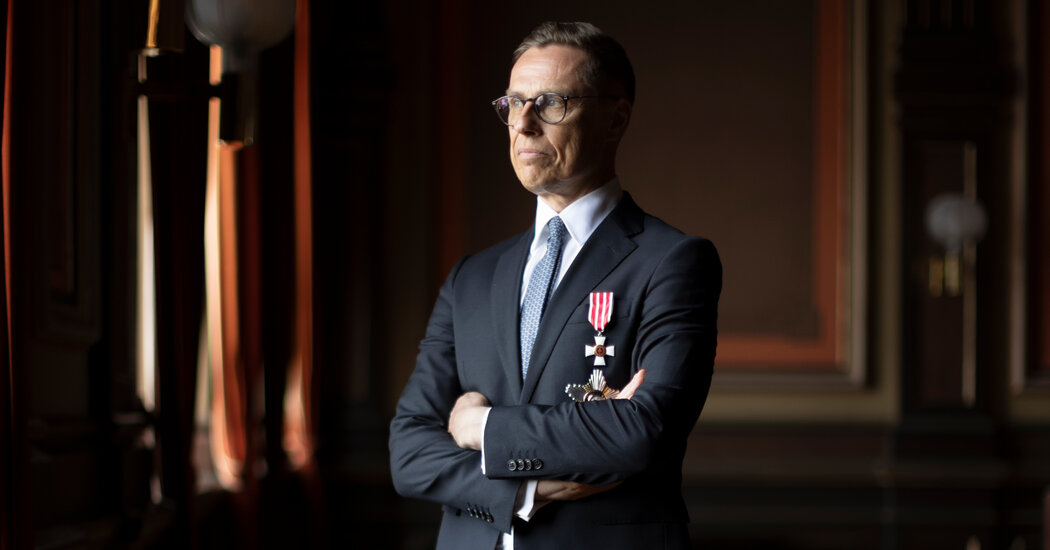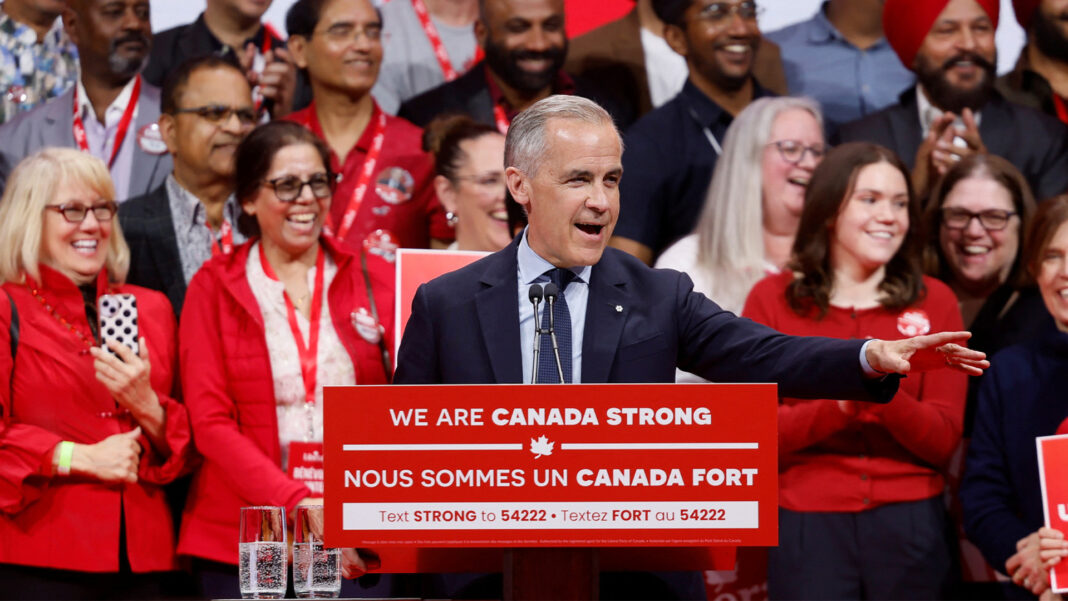A day after they golfed together in Florida, President Trump said he was “pissed off” at the Kremlin and threatened to impose sanctions on Russia’s oil customers.
Hours after they sat next to each other at Pope Francis’ funeral in Vatican City, Mr. Trump lit into Moscow for shooting missiles at civilian areas in Ukraine. “Too many people are dying!!!” Mr. Trump wrote on Truth Social on Saturday, again threatening Russia with sanctions if the Kremlin strung him along.
It could be a coincidence. Or Mr. Trump could be listening to Finland’s president, Alexander Stubb, who has emerged as a prominent voice of Europe’s smaller nations on Russia’s war against Ukraine.
In an interview with The New York Times on Sunday, Mr. Stubb downplayed his effect on Mr. Trump. He noted that President Emmanuel Macron of France and Prime Minister Keir Starmer of Britain were leading European efforts, with his role being merely to “nudge things in the right direction” and “try to connect the dots.”
But Mr. Stubb’s country understands the peril of peace negotiations for Ukraine perhaps better than any other. After wars with the Soviet Union in the 1940s, Finland gave up land to Moscow, agreed to neutrality and accepted limits on its military, remaining under the Kremlin’s thumb to some degree for decades.
Mr. Stubb doesn’t want Ukraine to suffer the same fate.
He declined to detail his conversations with the American president, though he said he left Vatican City feeling “a tad more optimistic” about the prospects for peace. But Mr. Trump, after their two recent meetings, has repeated almost verbatim the very message Mr. Stubb has been sending publicly: President Vladimir V. Putin of Russia will “play a cat-and-mouse game to the bitter end” and is stringing Washington along, requiring Mr. Trump to increase the pressure through “power and sanctions.”
“Everyone has to understand that the only thing that Putin understands is power,” Mr. Stubb said. “I mean, there’s a reason why Finland has one of the strongest militaries in Europe, and the reason is not Sweden.”
Russia shares an 835-mile border with Finland, and by Mr. Stubb’s count, has fought 30 wars or skirmishes against the Finns since the 1300s. An ancestor of his coauthored Finland’s declaration of independence in 1917, after a century of Finland’s being part of the Russian Empire, which followed several centuries of rule by Sweden.
Mr. Stubb, who took office last year and previously served as prime minister, warned that Mr. Putin would do the opposite of what he says.
“That is in the soul and spirit of Russian international relations,” he said.
A center-right leader, Mr. Stubb, 57, is uniquely equipped to appeal to Mr. Trump. He is a 6-foot-2 marathoner and triathlete who speaks fluent English with only a slight accent, plays near-professional-level golf — he competed on the Finnish national team — and brings a central-casting look to his position. He spent a year of high school in Daytona Beach and graduated from Furman University in South Carolina. He studied on a golf scholarship, becoming a self-described “avid pro-American.”
Despite claiming to play a bit role, Mr. Stubb has inserted himself in the Ukraine peace process in what he calls “a humble way,” regularly speaking with President Volodymyr Zelensky of Ukraine and other European leaders, in addition to Mr. Trump. He says he hopes his special understanding of the United States and Russia can be of assistance.
He said he sensed Mr. Trump’s exasperation.
“The president is running out of patience, and we’ve now seen statements which are quite tough on Putin and Russia,” Mr. Stubb said. “So I just hope the Kremlin understands that you don’t play with President Trump.”
He said Mr. Trump’s diminished patience could “actually then move things in the right direction” by forcing Russia to stop delaying.
But Mr. Trump has been known to abruptly change his public stances, often aligning them with people he has recently consulted. And despite his warnings to the Kremlin, he hasn’t followed through with any increased pressure on Mr. Putin, instead aiming much of his ire at Mr. Zelensky.
Mr. Putin declared a unilateral 72-hour cease-fire on Monday in what seemed to be a response to Mr. Trump’s outburst. But the measure fell far short of the 30-day unconditional cease-fire proposed by the United States and Ukraine.
In many ways, Finland sees itself in Ukraine’s troubles.
The Soviet leader Joseph Stalin invaded Finland in 1939, expecting a quick conquest in what became known as the Winter War. Vastly outmanned and outgunned, the Finns mounted a fierce resistance for more than three months, attacking unprepared Soviet forces on skis and sniping them from the forest.
The war ended in a 1940 treaty that forced Finland to give up approximately 10 percent of its land to Moscow, including much of Karelia, where Mr. Stubb’s father and grandfather were born. That territory remains part of Russia today.
The Finns joined Nazi Germany’s invasion of the Soviet Union in 1941 to reclaim their territory, but then lost it again in 1944. Agreements followed that restricted Finland’s military strength and prevented it from aligning with Western powers.
For the next 47 years, until the collapse of the Soviet Union in 1991, Finland retained its independence and capitalist system but remained restricted by Moscow on foreign and defense policy. Finnish news media largely refrained from criticizing the Soviet Union. The country couldn’t join NATO or develop a submarine fleet.
Finland’s situation gave rise to an uneasy existence of deference to a nearby superpower in foreign affairs, an arrangement political scientists labeled “Finlandization.”
Though it restricted Finland’s autonomy and ties to the West, “Finlandization” proved better than the postwar fate of the nearby Baltic nations, which Moscow integrated into the Soviet Union, or the Warsaw Pact countries, which were left with Communist systems that answered to the Kremlin.
“It’s an uncomfortable place to be in, but it was a successful strategy in all of its discomfort,” Mr. Stubb said.
Even so, he is determined not to let Ukraine be forced into a similar role.
“I would never bestow upon another state the predicament of a larger player determining some of the key elements of who you are as a country,” he said, calling on Europeans and Americans to “help out the Ukrainians to lose as little in this war as possible.”
U.S. negotiators have presented their proposed outline of a peace deal, which includes U.S. recognition of Crimea as Russian territory, he said, and Ukraine and the Europeans responded with a counterproposal, which Moscow rejected.
“What I suggest now is that we need to repackage these two proposals into something which gives the opportunity to strike a deal right now,” Mr. Stubb said.
Statehood consists of land, sovereignty and independence, he said, and Finland lost two of the three in the 1940s. He said he wanted Ukraine to keep all three, but accepted that it might have to make compromises on territory, reflecting battlefield realities.
“If we get at least two out of the three for Ukraine, I think it’s great,” he said. “But Finland will never, ever recognize any of the areas that Russia has annexed during this war from Ukraine.”
He said he believed that “a little bit of creative writing” could be drafted to stop the killing in Ukraine, even reflecting differences such as the U.S. willingness to recognize Crimea as Russian and the European refusal to do so in separate annexes. At some point, he added, Ukraine and Russia will need to negotiate directly.
“Right now, politically, the key is to maximize the pressure on Putin,” he said.
He said the security guarantees for Ukraine should include arming Kyiv “to the teeth,” so it could deter a repeat attack by Moscow. Then, he said, Europe should provide a primary security guarantee with a “backstop from the U.S.” What that looks like, he admitted, is unclear. A leaked draft of the original U.S. proposal published by Reuters suggested that the guarantors would be primarily European, and made no mention of U.S. involvement.
Mr. Stubb’s approach is a departure from that of his predecessor, Sauli Niinisto, sometimes called a “Putin whisperer.”
Mr. Niinisto played ice hockey with the Russian president and cast himself as a mediator, hosting Mr. Putin and Mr. Trump for their first summit in Helsinki in 2018. Mr. Putin’s invasion of Ukraine in 2022 made that approach untenable among Finns, who broadly sympathized with Ukraine’s plight, and their nation joined NATO in 2023 in response.
“Times, they are a-changing,” Mr. Stubb said.
The Finnish leader has shown dexterity in his dealings with Mr. Trump.
He offered to supply the United States with icebreakers, which Finland produces and Washington needs to compete in the Arctic. He has proposed that Europe buy more American liquefied natural gas to even the trade balance with Washington. He has played up his time in South Carolina, meeting with Senator Lindsey Graham, a Republican of that state, and having dinner with Treasury Secretary Scott Bessent, a native of the state.
And he has offered positive words publicly about Mr. Trump.
Mr. Stubb understands that for his nation of 5.6 million people, outnumbered by Russia by more than 25 to 1, foreign policy isn’t a game.
“For a small country like Finland, living next to a bigger place like Russia, quite often it’s about survival,” he said. “So, for us, foreign policy is real. It’s existential.”


